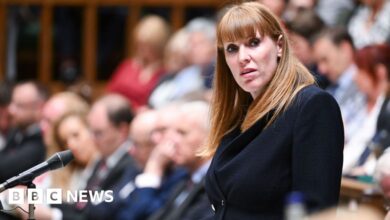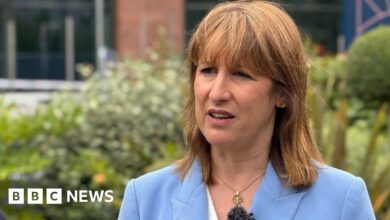Government has broken the law on sewage, says watchdog

The government and regulators have broken the law by being too lenient on water companies that spill sewage, the UK’s environment watchdog has found.
The Office for Environmental Protection (OEP) said sewage releases should only be allowed in exceptional circumstances, such as during unusually heavy rainfall, but that “this has not always been the case”.
It acknowledged that regulator Ofwat had now taken steps to change the way it implemented the law. The government and the Environment Agency are carefully “considering the allegations” but failure to accept them could result in legal action.
Campaigners welcomed the findings but called it a “bittersweet moment”.
Public anger has increased in recent years over the level of sewage spills which were found to have doubled in 2023.
“The OEP’s findings offer yet another devastating verdict of the total failure of environmental regulation in our country,” said chair and founder of River Action Charles Watson. “It is nothing short of scandalous.”
Sewage sometimes needs to be released when it is raining to prevent a build-up of wastewater in the system and sewage flowing back into people’s homes.
But two years ago the wildlife charity WildFish complained to the OEP that the Conservative government, and the regulators – Ofwat and the Environment Agency (EA) – were allowing excessive releases. It argued that according to the law sewage should only be released under “exceptional circumstances”, such as unusually heavy rain, rather than any wet weather.
Untreated sewage contains chemicals which can be harmful to aquatic life and can lead to a build-up of algae which starves local wildlife of oxygen and produces toxins that are potentially fatal to pets and dangerous to people.
And the less rainfall there is to dilute the sewage the more harmful it could potentially be.
Nick Measham, CEO at WildFish, told the BBC following the announcement: “We are absolutely delighted and relieved. It actually means we can end this problem of sewage going into rivers.
“But it is a bittersweet moment. It’s frustrating when the government and the regulators don’t actually do their job in the way you’d hope.”
The OEP has acknowledged that Ofwat has now taken steps to change the way it implements the law, and in August Ofwat announced record fines for three water companies.
But the government’s environment department, Defra, and the Environment Agency are currently consulting on any changes, and have said they would “carefully consider” the OEP’s allegations.
A Defra spokesperson said: “For too long, water companies have pumped record levels of sewage into our rivers, lakes and seas. In just five months, this government has acted decisively to refresh outdated guidance to make extremely clear our expectations around storm overflows.”
On Tuesday Defra also annouced that water companies would have to increase compensation for customers facing service failures such as water outages or pollution.
Customers would receive automatic payments of up to £2,000 for water supply outages, sewer flooding or low water pressure.
The announcement follows a public consultation in August.
If Defra and the EA decide to accept the finding in full – which they must do by March – it could result in changes to thousands of environmental permits.
There would also be a question as to whether water companies’ new five-year investment plans – which are due to be announced on Thursday – would be sufficient to upgrade infrastructure to meet these requirements.
A spokesperson for WaterUK, the industry body, told the BBC: “While regulators argue among themselves about what they think the rules are, water companies plan to deliver the world’s biggest ever programme to end sewage entering rivers.
“We await Ofwat’s decision on Thursday and hope they give us the green light so we can get on with it.”
However, if there is any dispute over what the OEP has found then it has said it could apply to the High Court for urgent judicial review.




